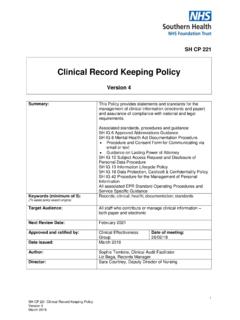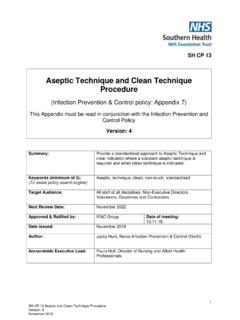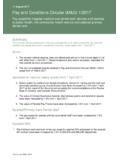Transcription of Wessex School of Psychiatry Course for Core Specialty Trainees
1 Edition 11 (16/07/2019) WessexCore Psychiatry Course2019-2020 Course HANDBOOKH ealth Education England WessexSchool of PsychiatryEdition 11 (16/07/2019) Wessex School of Psychiatry Course for core Specialty TraineesCourse Handbook 2019-2020 IntroductionThis Course was devised especially for you as a Wessex core Specialty training trainee in Psychiatry and has been running since September Course Handbook has been written by members of the Course development group for Trainees , module leads, Course facilitators, administrative staff and Trainees educational supervisors. In it we describe the Course and its special features, its overall purpose and basic structure, how it will run, and the educational principles (or philosophy) on which it is strongly recommend that you read it in conjunction with other important documents relating to the Course , particularly: The curriculum for core Specialty training published by the Royal College of Psychiatrists and the College syllabus on which the MRCP sych examination is based The handbooks for each of the modules that make up the Course Handbook for facilitators Guidance notes for educational supervisors Course has its own website: contains electronic versions of this handbook and other documents relating to the of the courseThe Course has several purposes, which we see as closely interrelated, in that we intend that it will enable you.
2 To practise Psychiatry at the highest possible standard, safely and at a level that is appropriate to your year of training and to prepare you for further specialist training in the future to link together various elements of your work, such as your clinical practice, your meetings with your educational supervisor, your personal study, and your revision for the MRCP sych examination to cover the College curriculum and examination syllabus to pass the MRCP sych examinationEach of these aims, on its own, is entirely laudable. However, the Course aims to integrate them, making your postgraduate education a rewarding, fulfilling and, we hope, enjoyable experience. We very much believe that the whole is greater than the sum of the parts . This is a basic premise of the principles behind the courseAs you can already see, we believe that you will become a better clinician as you integrate (that is, make connections between) the various otherwise separate strands of your working life.
3 The Course addresses this head Course has been devised on sound educational principles. Fundamentally, we recognise that we can t learn what there is to know about Psychiatry for you but we can provide (and, in the way we have planned the Course , have attempted to find effective ways of providing) educational opportunities to help you do this effectively ( so that your practice develops and is more soundly based) and efficiently (in the quickest possible time and in the most timely way).Of Course , all of this means that you have to do something too! You will see as you read through this handbook, and you will know from presentations the organisers will give about the Course , that success rests on what you put into it. You are a vital, and active, part of the is not just educational good sense. It s also necessary. Psychiatry , like all clinical specialties, is changing rapidly. New treatment options are becoming available. Alternative medications, some of them increasingly powerful, are being developed.
4 Service configurations are being altered, some in the face of financial constraints, others for social and humanistic reasons, some because the research evidence points in a particular direction. Many services have already moved out of hospitals into a community setting. Most are multi-agency. Very significantly for this Course , we recognise that the world of Psychiatry you will inherit will not only be new; it will be different from that of your current senior colleagues. Increasingly, in many instances, you won t be able to ask someone else what to do because they simply won t know. You will have to find it out to work it out for yourself. What is more, psychiatric practice will be changing round you as you continue through your career. The things you learn now might soon be outdated. This Course is designed not just for you to learn a lot about Psychiatry (and to pass the exam) but also to develop your capacity to go on learning and developing your practice for the rest of your all these reasons, the overriding educational model on which this new Course is based requires that YOU research (enquire into) your own emerging clinical practice.
5 This means you looking at what you do and how you do it, exploring the options, finding out what others suggest are good ways forward, and (this is the crucial point) you developing your professional judgement. When you are a senior clinician, you will be faced with situations of complexity and uncertainty where your juniors ask you for help. You ll know then (as your seniors know now) that sometimes there won t be a right answer, only one that is best in the circumstances you find yourself in. There might not even be an answer at all. All you might be able to do is to cope . That s why judgement lies at the heart of professional practice. And there won t be someone around to tell you what to do! You will need to be a self-directed learner . But you can t put that off until you have a senior position. You need to develop it now. The very first time you are on call you will quite probably have to use your judgement, even if it s to decide whether or not to call on someone else for support.
6 This Course is designed to help you do that, and to become that self-directed overall Course structureThe Course involves meetings on alternate Thursdays throughout the year and runs on 15 days each year are three years to the Course . The Course for core Trainees (Integrated Module) in the first year (CT1s) runs every year. The Course for CT2s and CT3s ( Specialty Modules) is combined and has a rolling programme that repeats every two Course is divided into several modules . Each module addresses a key area of your clinical practice, and is made up of various topics . All this relates to the College curriculum and the syllabus for the MRCP sych examination. Appendix 1 shows the programme for this year and Appendix 2, that for the entire three years of the structure of a moduleEach module has been allocated a certain amount of time depending on how this is reflected in your clinical placements and the length of each placement. The time allocation also reflects the emphasis given to a particular clinical discipline or knowledge area in the College syllabus, which in turn is reflected in the details of the examination (such as how many questions are devoted to the different topics).
7 We suggest that you look in detail at the module currently running to see how this works out in the best way to describe how the Course works is to look at a day in the life of a module and what this involves. The concept is this:Each module is divided up into a series of topics, and each topic lasts a day two half-days that is. Each day begins, in effect, after lunch on a Thursday afternoon and ends before lunch on a Thursday morning a fortnight later. So, in effect, the topic lasts two weeks overall, where two half-days are spent actually attending the perhaps now makes more sense of one of the key principles of the Course to link together your clinical work and your weekly educational supervision with what you are studying on the Course . The hope is that this not only makes the topics you will be studying on the Course more relevant (and interesting) but also that it will help you develop your clinical ll describe below what actually happens during this time but before that here s something about exam for the MRCP sych examAn important aim of the Course is to enable you to pass the MRCP sych exam, which is a crucial stepping stone in your progression through your Specialty training .
8 This is how the Course is arranged to deal with , the topics that are presented in the modules have been mapped against the College curriculum and exam syllabus: ( ) by the members of the Course planning team. Having said this, not all of the syllabus is (or ever can be by any Course ) covered in a Course : there just isn t time. This means that you will have to deal with some things through your own private study (as always). The Course design shows what this will entail ( the topics that the Course won t cover). You ll see below that we have some suggestions as to how you might go about Course will though, provide time for you to work on preparation for the exam. This will be the first session of the morning for Part A, that is, between : see diagram, Appendix 2. For Part A of the Course , the first term is largely Communication Skills, with two exam preparation sessions; the main exam preparation sessions will commence from the end of January 2020.
9 For Part B, exam preparation is integrated into the Course topics and will take place primarily within the Advanced Communication Skills session at the beginning of the morning. Information about the Psychotherapy section of the curriculum can be found at; of the programme for the exam preparation sessions will be made available at the first the most of your time on the courseYour learning set As we ve already said, each new topic starts after lunch on a Thursday. Following a general introduction to the topic (often with the whole group meeting together and probably by the module lead) you will then meet in your study group (which we have called a learning set for reasons that will become clear shortly).Your facilitatorsIn your learning set you will begin by discussing the brief you will have been given by the facilitators for that day. Facilitators are people (senior Trainees , staff grade doctors, Associate Specialists and Consultants) who have volunteered to do this work and are there to help guide you through the module s topic of the day and what is expected of you, see Handbook for Facilitators which you can find at; ( ).
10 It s worth saying at this point that facilitators aren t there to teach you, in the conventional sense of the word. They are there to help more with the process rather than the content of the content is dealt withWe should also re-emphasise that the content of the Course won t be presented through the more common approach of lectures . Rather, the content will be made available through recommended reading (from books and journals you either hold your own copies of or can access through library services see below, page 14), and at times through being given printed copies of material that otherwise might be difficult to get hold of or is of particular significance for the particular topic you are studying or the module partly your job will be to find out a lot of the content for yourself! (One of the educational principles here is that much of what you are told you will forget but that most of what you study for yourself you will remember.)



















